In less than two weeks hence, Nigeria would have, for the first time in history, enjoyed 20 years of unbroken civilian rule. The presidential system which defines the 20 years has, as its core, the president. Represented by both the letter and spirit of the 1999 Constitution as the father figure, chief exemplar and the chief advocate of the nation, the president has no duplicate anywhere else in the power configuration in Nigeria. That makes it sensible to isolate the office in terms of the making or unmaking of the country. In other words, if the president is the chief guide and democracy in Nigeria is roughly the president, then how have the presidents performed since 1999? In particular, which of the four presidents since 1999 can be said to have done better than all else and in what sense?
It is very unlikely there would ever be consensus on what performance itself speaks to. What is clear is that no ideologues, followers or friends of any of the presidents since 1999 can claim that democracy in Nigeria has brought home Nigeria’s share of the massive expansion in quality of life across the world. Or that democracy has meant Nigerians taking regular supply of electricity or stable water supply, multiple lane road networks or well equipped schools for granted. No! All those are still far fetched. The notion of the best president since 1999 can, therefore, only refer to which of them stayed the democratic order farthest from sliding into chaos rather than about Nigeria having anything to show in terms of a manufacturing economy or a model of good governance.
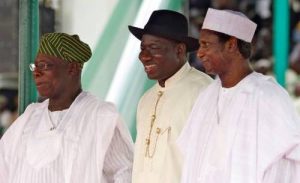
Obasanjo, Jonathan & late Yar’Adua
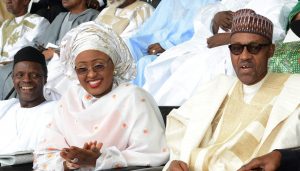
President Buhari, VP Osinbajo with their spouses
It is in that sense that an attempt is made below to establish whether it is Chief Olusegun Obasanjo who was in power from 1999 to 2007 or the late Alhaji Umaru Musa Yar’Adua who took over from 2007 to 2010? Is it Dr. Goodluck Jonathan who ran the show from 2010 to 2015 and from whom Muhammadu Buhari, the incumbent president, took over?
The above sequence shows that, aside from Chief Obasanjo, no other president has completed two terms of eight years yet. But the length of time each president spent in office is discounted in this assessment because Yar’Adua, for example, cannot be brought back in any way to complete his eight years just as Dr. Jonathan also might never be. Since their own time cannot be dismissed, even those like President Buhari who have spent four years will be scored along with those who spent eight years on one hand and those who spent very much less than that on the other hand.
The approach is to list as much random empirical facts for and against each of the four presidents and then try to situate such facts in their contexts towards arriving at a rating.
Obasanjo: Credit side
- Constituting a Government of National Unity which showed his government’s consciousness about such a guarantor of peace in post-conflict societies, irrespective of how much it helped the People’s Democratic Party, (PDP) or the nation at large
- Carrying out, with the support of his Defence Minister, the decentering of ‘politically exposed soldiers’, an action rightly or wrongly but generally cited to have guaranteed 20 years of uninterrupted democracy.
- Setting up or strengthening of institutions, particularly the setting up of all the new anti-corruption institutions – the Economic and Financial Crimes, (EFCC) and the Independent Corrupt Practices Commission.
- Successfully de-escalating the Sharia crisis without the Armageddon that the public sphere was waiting for
- A style of fighting corruption which though heavily criticised for selectiveness, still gives him the image of one who also fought his own boys such as Tafa Balogun, the then Inspector-General of Police who received the most dramatic humiliation and many PDP governors and ministers who were either impeached or removed.
- Source or supervisor of some modernist practices in governance such as the idea of Due Process, a Presidential Monitoring Unit, a public procurement framework, notwithstanding how they worked in practice or how the heads of such processes ran the show
- Foreign policy activism that, as controversial in substance and essence, was intrusive, such that, for the first time, the G-7/8 had dealing with African leaders as an item all their meetings
- The very few African leaders who could openly rail at the international system or its leading drivers
- Acknowledged workaholic even by his harshest critics
- Absolutely accessible to his ministers and directly too
- Give him a 100 page memo, he reads it overnight and three, four weeks later, he can be heard quote one paragraph or another from it
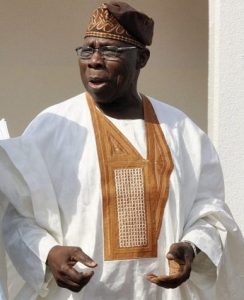 Obasanjo: Debit side
Obasanjo: Debit side
- The belief that he ruined the economy by his subscription to auctioning state owned enterprises at the behest of foreign interests
- The policy of deliberately undermining the party to a point that the best negotiated party in the history of Nigeria is now a shadow of its self
- Endlessly raising the price of fuel without a care for the consequences
- The temptation to impose candidates or depose those he disliked. He did this at the national Assembly throughout, at the level of the PDP and on the nation in 2007. What if he left a legacy of allowing democracy to work?
- People still cannot understand why he committed so much to paying foreign debt
- Could he not have eliminated Boko Haram even in 2006?
- Why did he find fighting so many people attractive when he could have been the reconciler?
Yar’Adua: Credit side
- A Socialist background that, in spite of everything, gave him the political education that is not usual among those who emerged as Nigerian leaders
- The courage to reverse the sale of some State Owned Enterprises by his predecessor
- The credit of openly admitting that the election that brought him to power was too fraudulent and seeking to reform the electoral process
- Coming up with the Amnesty response to the Niger Delta insurgency
- The back channel approach to governance such that enables the sitting president a more complete information on a specific issue
- Cultivating and managing the image of a not so greedy or corrupt a person
Yar’Adua: Debit side
- Accepting the job when he must have known that he was very unlikely to go far
- Lopsided appointment was an issue under his administration if we recall long rebuttal of same by his spokes person, Segun Adeniyi.
- The image of submitting to corruption
- Responsibility for what Boko Haram turned into
Goodluck Jonathan: Credit side
- A unifying narrative in and of himself with “the boy who had no shoe” image with which he entered the arena
- Walking the talk about his second term not worth the blood of any Nigerians, thereby saving Nigeria of unnecessary bloodshed
- Brought respectability to Nigeria by conceding defeat even while votes were being counted, an action the world was not expecting from Africa
- There was no controversy of lopsided appointments under him. Under him, not only was the National Security Adviser after the initial appointee someone outside his region, a ministry such as FCT was similarly held
- Convening the 2014 National Conference since Nigerians can never exhaust the inter-subjective space
- Never known for aggressive or confrontational personality in terms of exercise of power
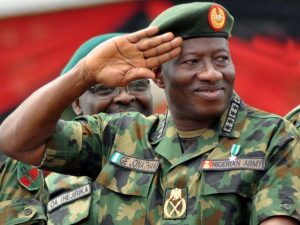
Dr Goodluck Jonathan
Goodluck Jonathan: Debit side
- Given his limited exposure in governance but the symbolism of a Vice-President of Niger Delta origin in Nigeria at the time, why, for goodness sake, did he not dash out to retool himself quickly between his election as Vice-President and the swearing-in on May 29th, 2007? Did it not cross his mind that his personal capability could have helped Nigeria so much?
- How could looting with abandonment become the signature tune of a government headed by a Jonathan, an “only son”, politically speaking?
- A failure in routing Boko Haram, getting lost instead into the ding-dong: The North’s belief that the Jonathan regime was behind Boko Haram to deal with the region just as the regime believed Boko Haram was a Northern instrument to undo the Jonathan regime?
- To what extent did Goodluck Jonathan as president offer anything that can be called unique in relation to the crisis in the Niger Delta?
- Nothing to cite for Goodluck Jonathan in foreign policy, either by way of statements he made or advantages negotiated
Buhari: Credit side
- Buhari as a narrative in tenacity in seeking presidential office
- Inheriting an economy that all the economists and key technocrats agreed was already deeply in trouble
- Getting the nation out of recession
- The courage of acknowledging corruption and proclaiming itself an anti-corruption regime
- Concentrating on on-going projects instead of the old practice of abandoning what previous regime initiated, with particular reference to the railways and the Mambila Plateau projects
- Creating an agricultural revolution
- The image of one who is still not personally corrupt
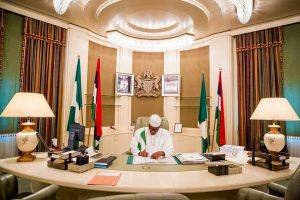 Buhari: Debit side
Buhari: Debit side
- Leaving the nation without ministers for half a year between June and December 2015
- Constituting a government that is empirically very lopsided in religious and regional terms, especially appointment of security chiefs
- Conversion to neoliberal strategy in managing a non-industrial economy such as Nigeria
- Not only failed so far to run Boko Haram out of town but also watched herdsmen and bandits impose their own terms on the country
- Complicity in false information by calling herdsmen renegade fighters from Libya but only for the government to eventually begin negotiation with Miyetti Allah which is what Nasir el-Rufai, an APC ideologue, correctly stated much, much earlier.
- Taking Nigeria out of recession but after taking Nigeria into recession in the first case
- Taking fuel price from N87 to N145
- Short shrifting rule of law by not putting certain persons on trial for crimes known to the law instead of the option of their perpetual detention
- Failure in due diligence in the many cases of people with bad reputation who surfaced in their offices, the best example of such being Rasheed Maina
- Managing the All Progressives Congress, (APC) intro fracturing
- The image of overrating loyalty at the expense of fighting corruption once a suspect crosses over to his side
- Superintending a problematic election in February/March 2019
- Presiding over a nation rated to be more divided than at any other time
- No records yet in institution building, especially new ones
- The ruining of the much advertised agricultural revolution by the collapse of the rural economy to generalized insecurity
Assessment and the Result
Six key issue areas can be identified in the above survey and these are presidential personality; economic management model; level of corruption and style of fighting corruption; conflict management and security/peace; institution building and foreign policy.
Every president has his or her presidential personality. No particular presidential personality can be scored higher than the other. So, each of the four here is granted his.
From the above listing, none of the presidents since 1999 veered off the so-called market economy model. They all, therefore, score zero there with the possible exception of Umaru Yar’Adua who was moving towards the mixed economy model but not categorically enough to be exempted. Intervention stands to be corrected.
All the presidents since 1999, except Umaru Yar’Adua, killed or tried to kill the party that brought them to power
All the presidents since 1999 failed the Boko Haram test.
While Obasanjo scores 100 % in institutionalism, all the rest score zero there. Again, Intervention stands to be corrected.
Obasanjo’s foreign policy activism remains unmatched too. It doesn’t matter that some critics say he was looking for something like the Nobel Peace prize. It doesn’t matter because some of the discourses he promoted have consequences far beyond him.
The result is still in favour of Obasanjo when it comes to level of corruption/style of fighting corruption. This is to the extent that no other presidents has escaped the charge of selectivity
On conflict management and security or peace, none of the four presidents has been spared a dangerous moment. Obasanjo confronted the Sharia threat. Yar’Adua confronted the Niger Delta insurgency. Jonathan confronted Boko Haram and the 2015 election while Buhari has been challenged by Boko Haram, ‘herdsmen’ and bandits.
What this summary means is that even the management of breaking points is evenly distributed and each president’s score there can decide the final rating. This is for the simple reason that there has to be a country before any other things can happen.
From the records, Obasanjo de-escalated the Sharia crisis beautifully; Yar’Adua got it right on the Niger Delta crisis; Jonathan failed the Boko Haram test but carried the prize in handling 2015. Buhari is the only president yet to win a prize in this regard – Boko Haram is still rampaging aside from well armed ‘herdsmen’ and bandits. Matters have been compounded by the level of violence in the conduct of the 2019 elections.
The above paragraph leaves us with Obasanjo, Yar’Adua and Jonathan as contenders for the best president since 1999. It compels raising the question of which of the high noons could have spelt disaster faster for Nigeria as to warrant the president in power at the time to cart away the prize? Was it the Sharia crisis or the Niger Delta insurgency or the 2015 election?
This is the question that part 2 of this report will respond to!




























